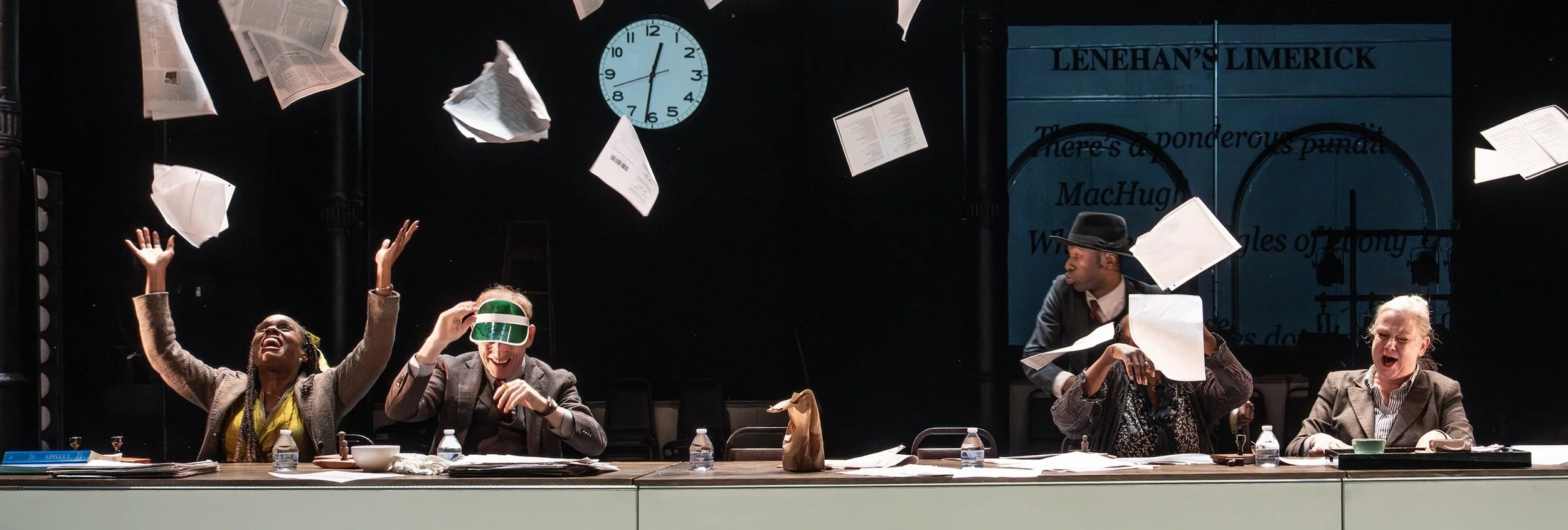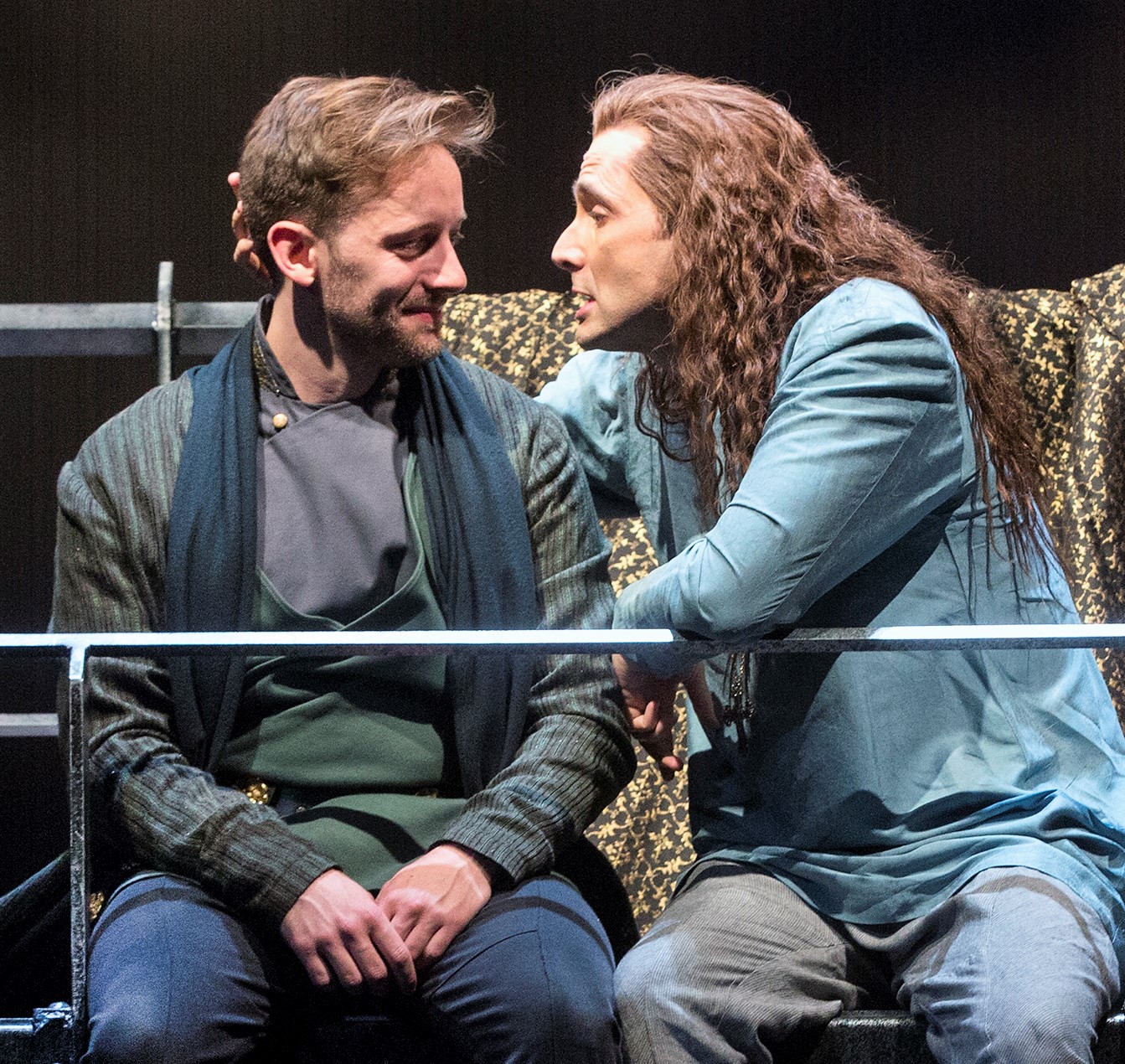Gregory Doran’s production of Richard II at the Brooklyn Academy of Music is a thunderous start to “King and Country,” the umbrella title for Shakespeare’s histories of three consecutive kings, Richard II, Henry IV (in two parts) and Henry V, visiting from the Royal Shakespeare Company, where Doran is artistic director.
Perhaps “thunderous” is not the right word, since David Tennant’s Richard is never shown at war, but is a frivolous and arrogant ruler as the play opens. He holds himself imperiously aloof in the early scenes, clutching his orb and scepter, but Tennant also finds much humor in the flawed character. The play turns on family relationships, and in describing his cousin, Henry Bolingbroke, the actor terms him “my father’s brother’s son” with slight hesitation between the words, as if Richard is saying to himself, “I’ve got to get this tricky part right.”
Jasper Britton (left) is Henry Bolingbroke and Matthew Needham is his son, Harry Percy, aka Hotspur, in Richard II. Top: King Richard II (David Tennant, right) with Sam Marks as Aumerle.
In order to fund wars to subjugate the Irish, Richard plans to tax the rich. With Bolingbroke banished for feuding with another noble, and his father, John of Gaunt, dead, Richard seizes the inheritance that belongs to his cousin, and goes off to war, where he is unaware of a rebellion at home: Bolingbroke has returned from exile to claim his inheritance and is likely to depose Richard. At the center of the play is the issue of divine right: does the king rule as God’s representative on Earth? Is everything he does God’s will?
Doran plays up the notion of Richard as a divine figure with costume supervisor Stephanie Arditti’s white robe that gives Richard, with very long hair, the look of Christ. The language of Christianity is threaded throughout: “balm,” “water” and “Pilate.” In a climactic scene, Richard himself calls his eventual killer “Judas.” (It’s a key change from Shakespeare, where Richard is slain by Sir Piers Exton, an assassin; this murderer is closer to home.)
The other key relatives in Richard II besides the short-lived John of Gaunt (Julian Glover), who delivers the speech about “this earth, this realm, this England” thrillingly, are the Duke of York, the last of seven sons and also Richard’s uncle, and his son Aumerle (Sam Marks), who becomes Richard’s cousin-with-benefits in Doran’s reading—the homosexual subtext is more forthright here but not unheard-of. Oliver Ford Davies plays the Duke of York with a booming voice, by turns denouncing his nephew Bolingbroke and then backing off. Torn between believing the king is chosen by God, yet finding his regency while the king fights in Ireland is undermined by men with troops, he finally says, “I am neuter” in a great Shakespearean pun.
There is a brief appearance, too, by Harry Percy (Matthew Needham), who will become known as Hotspur by Henry IV, Part 1 and is already clearly a man of action and sinew, albeit a bit dim.
Britton (right) with Sean Chapman as Northumberland. Photographs by Richard Termine.
Richard II is all verse, and is spoken commandingly here. Tennant raises the pitch of his voice as the lightweight king. His delivery of “For God’s sake, let us sit upon the ground/And tell sad stories of the death of kings” is beautifully staged—his dwindled retinue all sit, although it’s clear their butts are unfamiliar with the Earth. When Richard then takes off his crown and contemplates it, the parallel of Hamlet looking at Yorick’s skull is unmistakable. (Some critics viewed Tennant’s Hamlet in 2008 as the best since Laurence Olivier’s; this New York debut is mandatory for anyone who regrets missing that.) The crown itself is used again when Tennant spars wittily and cleverly with Bolingbroke. He takes it off and holds it out to his side. “Seize the crown,” Richard tells Bolingbroke, and then, in the tone of coaxing a dog to fetch, “Heee-re, cousin.”
With the language on display, the primary feature of Stephen Brimson Lewis's set is a catwalk that descends at times for Richard’s court appearances; projections, including a white stag and a bloody moon, add color. Trios of trumpeters and plainsong singers in the side balconies provide considerable aural texture, while the smell of incense is an unexpected addition of medieval atmosphere along with Tim Mitchell’s tenebrous lighting.
Any quibbles are minor. Occasionally a character lowers a voice and a word or phrase is dropped. Leigh Quinn’s Queen is passionate and speaks clearly, but one wishes her power of projection were as strong as her acting.
Overall, though, Doran has created this 14th-century Shakespearean world with great precision, attending not just to Tennant’s towering performance, but to tiny moments: the forgetfulness of Jane Lapotaire’s Duchess of Gloucester, the dry joke cracked by a lady-in-waiting and the chilling prophesies from a minor character: “The pale-faced moon looks bloody on the earth/And lean-looked prophets whisper fearful change.” This Richard II is curtain-raiser to what promises to be a landmark visit.
The Royal Shakespeare Company’s Richard II plays in repertory with Henry IV, Parts 1 and 2, and Henry V, through April 21 at BAM Harvey Theater (30 Lafayette Ave. between Ashland Place and St. Felix Street in Brooklyn) through April 29. Tickets start at $35 and are currently on standby for this performance. Visit www.bam.org/theater/2016/richard-ii for information on availability or the day-ticket lottery.









